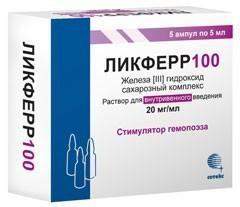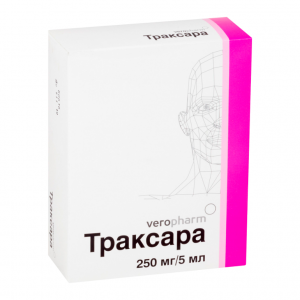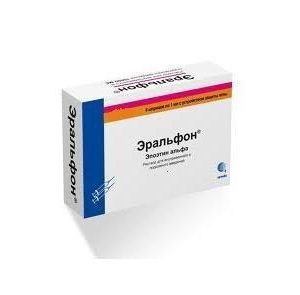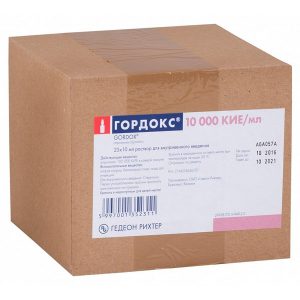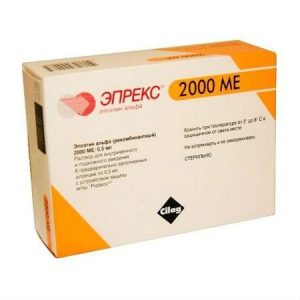Description
Release form
solution for intravenous administration
Packing
5 ampoules 5 ml each
Pharmacological action
Likferr100 – antianemic.
Pharmacodynamics
An iron preparation that regulates metabolic processes. It is a colloidal solution, which consists of spheroidal iron-carbohydrate nanoparticles. In the core (center) of each particle is iron (III) hydroxide. The core is surrounded by a sucrose membrane that stabilizes iron (III) hydroxide, slowly releases bioactive iron and stores the resulting particles in a colloidal solution. As a result, a complex is formed whose molecular weight is approximately 43 kDa, as a result of which it cannot be excreted unchanged through the kidneys. Iron (III) in this complex is associated with structures similar to natural ferritin.
The active substance of the drug is iron (III) hydroxide, the sucrose complex, when ingested, dissociates in the reticuloendothelial system into iron and sucrose. Due to the lower stability of sugar iron in comparison with transferrin, a competitive exchange of iron in favor of transferrin is observed. As a result, about 31 mg of iron is transferred in 24 hours. Polycyclic iron (III) hydroxide is partially preserved in the form of ferritin after complexation with a protein ligand – liver mitochondria apoferritin. The hemoglobin index rises faster and with greater reliability than after therapy with drugs containing iron (II). The introduction of 100 mg of iron (III) leads to an increase in hemoglobin by 2-3% during pregnancy – by 2%. The toxicity of the drug is very low. The therapeutic index is 30 (200/7).
Pharmacokinetics of
After a single intravenous administration of Likferr100 ® containing 100 mg of iron, Cmax iron (average 538 mmol) is achieved 10 minutes after injection. T1 / 2 – 6 hours. Vss is approximately 8 l, which indicates a low distribution of iron in body fluids.
Iron excretion by the kidneys for the first 4 hours after injection is less than 5% of the total clearance. After 24 hours, the serum iron content returns to its original (before administration) value, and approximately 75% of sucrose leaves the vascular bed.
Indications
iron deficiency conditions (including iron deficiency and acute posthemorrhagic anemia) if fast iron replenishment is necessary
with intolerance to iron preparations for oral administration of
gastrointestinal tract diseases, in which iron preparations cannot be taken orally.
Contraindications
hypersensitivity to the components of the drug Likferr100
anemia not associated with iron deficiency
the presence of signs of iron overload (hemosiderosis, hemochromatosis) or a violation of its utilization
I trimester of pregnancy.
Caution: bronchial asthma
eczema
is a polyvalent allergy, allergic reactions to other parenteral iron preparations (due to the high risk of allergic reactions – see the ² ÑSpecial Instructions ² Ñ section)
liver failure
acute infectious diseases
low serum binding / or folic acid deficiency
diabetes mellitus (see special instructions section)
children’s age (up to 18 years) (due to insufficient safety and efficacy data).
Use during pregnancy and lactation
Ovestin ® is contraindicated during pregnancy. In case of pregnancy during treatment with Ovestin ®, may cause fetal development disorders or have a negative effect on the newborn, including death. If pregnancy is detected during the period of treatment with Ordiss ®, it is necessary to immediately cancel the drug. When planning pregnancy, it is necessary to transfer the patient to adequate therapy, approved for use during pregnancy.
Newborns whose mothers took Ordiss ® during pregnancy should be under medical supervision because of the likelihood of developing hypotension.
It is not known whether candesartan passes into breast milk. NS should use the drug Ordiss ® during breastfeeding. Breastfeeding should be stopped if it is necessary to use the drug in the mother. if the intended benefit to the mother outweighs the potential risk to the fetus. During lactation, the safety of the drug has not been established. It is recommended to stop breastfeeding (if necessary, use the drug) or cancel the drug.
Special instructions
The rate of administration of Likferr100 ® should be strictly observed (blood pressure may decrease with rapid administration). A higher incidence of adverse side reactions (especially a decrease in blood pressure), including and severe, is associated with an increase in dose. Thus, the time of administration of the drug given in the section “Method of use and dose” should be strictly observed, even if the patient does not receive the drug in the maximum tolerated single dose.
During the introduction of the drug Likferr100 ® it is necessary to control hemodynamic parameters.
Likferr100 ® should be prescribed only to those patients in which the diagnosis of anemia is confirmed by appropriate laboratory data (for example, the results of determination of serum ferritin or hemoglobin and hematocrit, the number of red blood cells and their parameters – the average volume of the red blood cell or the average hemoglobin in the red blood cell).
IV iron preparations can cause allergic or anaphylactoid reactions, which can be potentially life-threatening. Patients with asthma, eczema, atopic diseases, polyvalent allergies, allergic reactions to other iron preparations, as well as patients with low iron binding capacity of serum and / or folic acid deficiency, have an increased risk of allergic or anaphylactoid reactions (see “Contraindications”, Carefully).
Patient studies having reactions of hypersensitivity to iron dextran, showed the absence of complications during treatment with the drug.
Avoid the penetration of the drug into the parietal space, as If the drug Likferr100 ® gets outside the vessel, it leads to tissue necrosis and brown skin staining. In the case of the development of this complication, it is recommended (if the needle is still in the vessel) to introduce a small amount of 0.9% sodium chloride solution. To accelerate the excretion of iron and prevent its further penetration into surrounding tissues, it is recommended that heparin-containing preparations be applied to the injection site (the gel or ointment is applied with light movements, without rubbing).
Inadmissible administration of the drug in the presence of sediment.
1 ml of Likferr100 ® contains between 260 and 340 mg of sucrose. These data must be considered in patients with diabetes. With the drip of the drug, depending on the indications, the maximum tolerated single dose can reach 500 mg of iron, which corresponds to the introduction of 8.5 g of sucrose. When recalculating a given amount of carbohydrates in XE (1 XE = 12 g of carbohydrates), it corresponds to 0.7 XE.
During therapy with erythropoiesis stimulants, iron metabolism is monitored using indicators such as serum ferritin concentration and iron transferrin saturation (STI). Determining the number of hypochromic red blood cells and the concentration of hemoglobin in reticulocytes helps to decide on the need for the appointment of iv iron preparations when there is hyperferritinemia and low NTZ. The risk of iron overload is compensated by blood loss during dialysis procedures (1-3 g of iron per year is lost). Serum ferritin concentration should be regularly monitored. A concentration of serum ferritin above 500 Ñg / L (with a normal C-reactive protein), persisting for a long time, may indicate iatrogenic iron overload. In such cases, iron preparations should be discontinued (therapy with erythropoiesis stimulants should continue). Due to the fact that iron stimulates the growth of most microorganisms, iron preparations should be discontinued during the development of acute bacterial infections. Also, iv therapy with iron preparations should be carried out with caution in patients with permanent dialysis catheters.
Impact on the ability to drive vehicles or work with potentially dangerous machinery. Caution is advised when driving or handling potentially hazardous machinery.
Composition
active substance: iron (III) hydroxide sucrose complex (in terms of iron (III) 20 mg
excipients: sodium hydroxide – up to pH 11 water for injection – up to 1 ml
Dosage and administration
Intravenously (slowly in a stream or drip), as well as in the venous section of the dialysis system. The drug is not intended for i / m administration. The simultaneous administration of a full (cumulative) therapeutic dose of the drug is unacceptable.
A test dose must be given before the first therapeutic dose. If intolerance phenomena occur during the observation period, the drug should be discontinued immediately. Before opening the ampoule, you need to inspect it for possible sediment and damage. You can use only brown solution without sediment.
Drip administration
Likferr100 ® is preferable to be administered during a drip infusion in order to reduce the risk of a pronounced decrease in blood pressure and the risk of the solution entering the circulatory space. Immediately prior to Likferr100 ® infusion, dilute with a 0.9% sodium chloride solution in a ratio of 1:20 – for example, 1 ml (20 mg of iron) in 20 ml of a 0.9% sodium chloride solution. The resulting solution is introduced at the following speed: 100 mg of iron – in at least 15 minutes 200 mg – within 30 minutes 300 mg – within 1.5 hours 400 mg – within 2.5 hours 500 mg – within 3.5 h. The introduction of the maximum tolerated single dose of 7 mg of iron / kg should be carried out for a minimum of 3.5 hours, regardless of the total dose of the drug.
Before the first drip of a therapeutic dose of Likferr100 ®, a test dose must be administered: 1 ml of Likferr100 ® preparation (20 mg of iron) for adults and children with a body weight of more than 14 kg and half a daily dose (1.5 mg of iron / kg) for children with a body weight of less than 14 kg for 15 minutes. In the absence of adverse events, the remainder of the solution should be administered at the recommended rate.
Squeeze
Likferr100 ® can also be administered as an undiluted iv solution slowly, at a rate of 1 ml of Likferr100 ® (20 mg of iron) per minute – for example, 5 ml of Likferr100 ® (100 mg of iron) is administered for 5 min . The maximum volume of the drug should not exceed 10 ml of Likferr100 ® (200 mg of iron) per injection.
After the injection, the patient is recommended to fix the arm in an extended position for some time.
Before the first jet injection of a therapeutic dose of Likferr100 ®, the test dose should be administered: 1 ml of Likferr100 ® (20 mg of iron) for adults and children weighing more than 14 kg and half the daily dose (1.5 mg of iron / kg) for children, having a body weight of less than 14 kg, for 1-2 minutes. In the absence of adverse events during the next 15 minutes of observation, the remainder of the solution should be administered at the recommended rate. After the injection, the patient is recommended to fix the arm in an extended position.
Introduction to the dialysis system
Likferr100 ® can be injected directly into the venous area of the dialysis system, strictly following the rules described for intravenous injection.
Calculation of the dose
Before administration, it is necessary to individually calculate the total iron deficiency in the body according to the following formula:
Total iron deficiency (mg) = body weight (kg)? ( b normal – b of the patient (g / l)? 0.24 + deposited iron (mg).
For patients with body weight less than 35 kg: amount of deposited iron = 15 mg / kg
normal indicator b = 130 g / l
For patients weighing more than 35 kg: the amount of deposited iron = 500 mg
normal indicator b = 150 g / l
Coefficient 0.24 = 0.0034? 0.07? 1000 (iron content in hemoglobin = 0, 34% blood volume = 7% of body weight coefficient 1000 = conversion from grams to milligrams.
Then you should calculate the cumulative (course) dose of Likferr100 ®, which you need udet should be introduced to fill the deficiency of iron in the body, according to the following formula:
Total volume of the drug (ml) = Total iron deficiency (mg) / 20 mg / ml
Adults, incl. elderly (over 65 years old) patients: 5-10 ml Likferr100 ® (100-200 mg of iron) 1-3 times a week.
Children: There is only limited data on the use of the drug in children. If necessary, it is recommended to administer no more than 0.15 ml of Likferr100 ® (3 mg of iron) / kg 1-3 times a week, depending on the Hb index.
Maximum tolerated single dose for adults, including elderly (over 65 years old) patients
For jet administration: 10 ml of Likferr 100 ® (200 mg of iron), the duration of administration is at least 10 minutes.
For drip administration: depending on the indications, a single dose can reach 500 mg of iron. The maximum permissible single dose is 7 mg of iron / kg and is administered 1 time per week, but not more than 500 mg of iron.
As a rule, large doses are associated with a higher incidence of adverse events.
In the event that the total therapeutic dose exceeds the maximum permissible single dose, fractional administration of the drug is recommended.
If hematological parameters do not improve after 1-2 weeks after the start of treatment with Likferr100 ®, the initial diagnosis should be reviewed.
Dose calculation for replenishing iron after blood loss or autologous blood donation
The dose of Likferr100 ® required to compensate for iron deficiency is calculated using the formula below.
If the amount of blood lost is known: iv administration of 200 mg of iron (10 ml of Likferr 100 ®) leads to the same increase in Hb concentration as transfusion of 1 unit of blood (400 ml with a concentration of Hb 150 g / l).
The amount of iron to be replenished, mg = number of units of blood lost? 200 or the required volume of Likferr100 ®, ml = the number of units of lost blood? 10.
If the Hb content is reduced: the previous formula should be used, provided that the iron depot is not replenished.
Amount of iron to be replenished, mg = body weight, kg? 0.24? (normal indicator of Hb – Hb of the patient), g / l.
For example: body weight – 60 kg, Hb deficiency = 10 g / l – the required amount of iron = 150 mg, the required volume of the drug Likferr100 ® = 7.5 ml.
Patients with chronic renal disease undergoing hemodialysis and receiving additional treatment with erythropoietin
The drug is administered strictly iv. The injection itself should be carried out as slowly as possible, the duration of administration increases with increasing dose. The procedure is not particularly difficult for hemodialysis patients, as they usually have suitable I / O. The drug is administered in a 0.9% sodium chloride solution for at least 15 minutes during the last 2 hours of a hemodialysis session.
Absolute iron deficiency (anemia correction phase)
30 50 mg of iron / dialysis session
or
1000 mg of iron for 6 10 weeks.
Supporting therapy phase
Various doses are prescribed in different modes: 10 25 mg of iron /
dialysis session or
100 mg of iron / 1 time per month (depending on serum ferritin concentration).
Hemoglobin correction phase
150 mg of iron to increase concentration by 10 g / l.
Side effects of
From the central nervous system: dizziness, headache, loss of consciousness, paresthesia.
On the part of the cardiovascular system: palpitations, tachycardia, decreased blood pressure, collapse states, a feeling of heat, flushing of the face, peripheral edema.
From the respiratory system: bronchospasm, shortness of breath.
From the digestive system: transient taste disturbances (especially a metallic taste in the mouth), “spilled” abdominal pains, pain in the epigastric region, diarrhea, taste perversion, nausea, vomiting.
From the skin: erythema, itching, rash, pigmentation, increased sweating.
From the musculoskeletal system: arthralgia, back pain, swelling of the joints, myalgia, pain in the limbs.
Allergic reactions: anaphylactoid reactions, facial edema, laryngeal edema.
Other: asthenia, chest pain, back pain, feeling of heaviness in the chest, weakness, malaise, pallor, fever, chills.
Local reactions: pain and swelling at the injection site (especially with extravasal ingestion of the drug), phlebitis, burning sensation, hematoma.
If any of these side effects worsen or any other side effects develop, you should inform your doctor.
Drug Interactions
Simultaneous administration of the drug Likferr100 with dosage forms of iron for oral administration is unacceptable. iron absorption from the gastrointestinal tract decreases. Treatment with oral iron preparations can be started no earlier than 5 days after the last injection. Likferr100 can be mixed in a single syringe with only 0.9% sodium chloride solution. No other IV solutions and therapeutic agents are allowed to be added, since there is a risk of precipitation and / or other pharmaceutical interactions. Compatibility with containers made of materials other than glass, PE and PVC has not been studied. If the patient takes other drugs, it is necessary to consult a doctor.
Overdose
Symptoms: decreased blood pressure (signs of collapse manifest within 30 minutes), symptoms of hemosiderosis.
Treatment: symptomatic, if necessary – iron binding iron (chelators), such as deferoxamine.
Storage conditions
At a temperature not exceeding 25 ° C (do not freeze).
Shelf life
3 years
Deystvuyushtee substance
irons III gidroksid sucrose complex
Terms and conditions
prescription
dosage form
infusion solution
Appointment
Appointment
Adults doctor’s prescription
